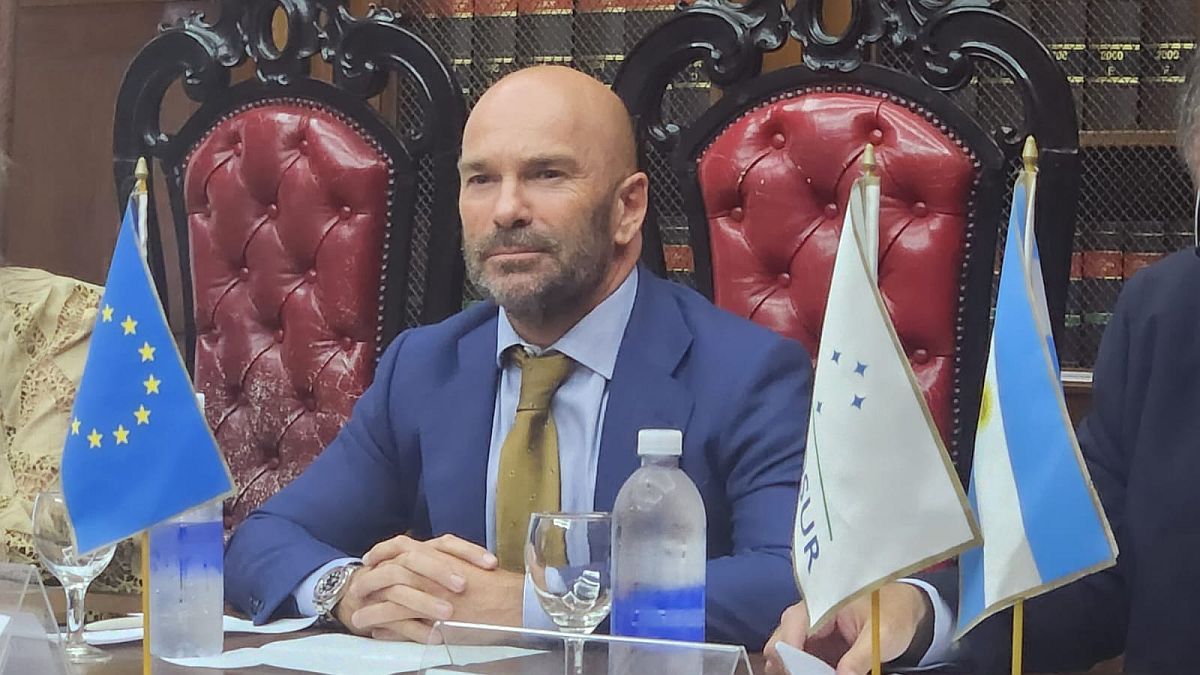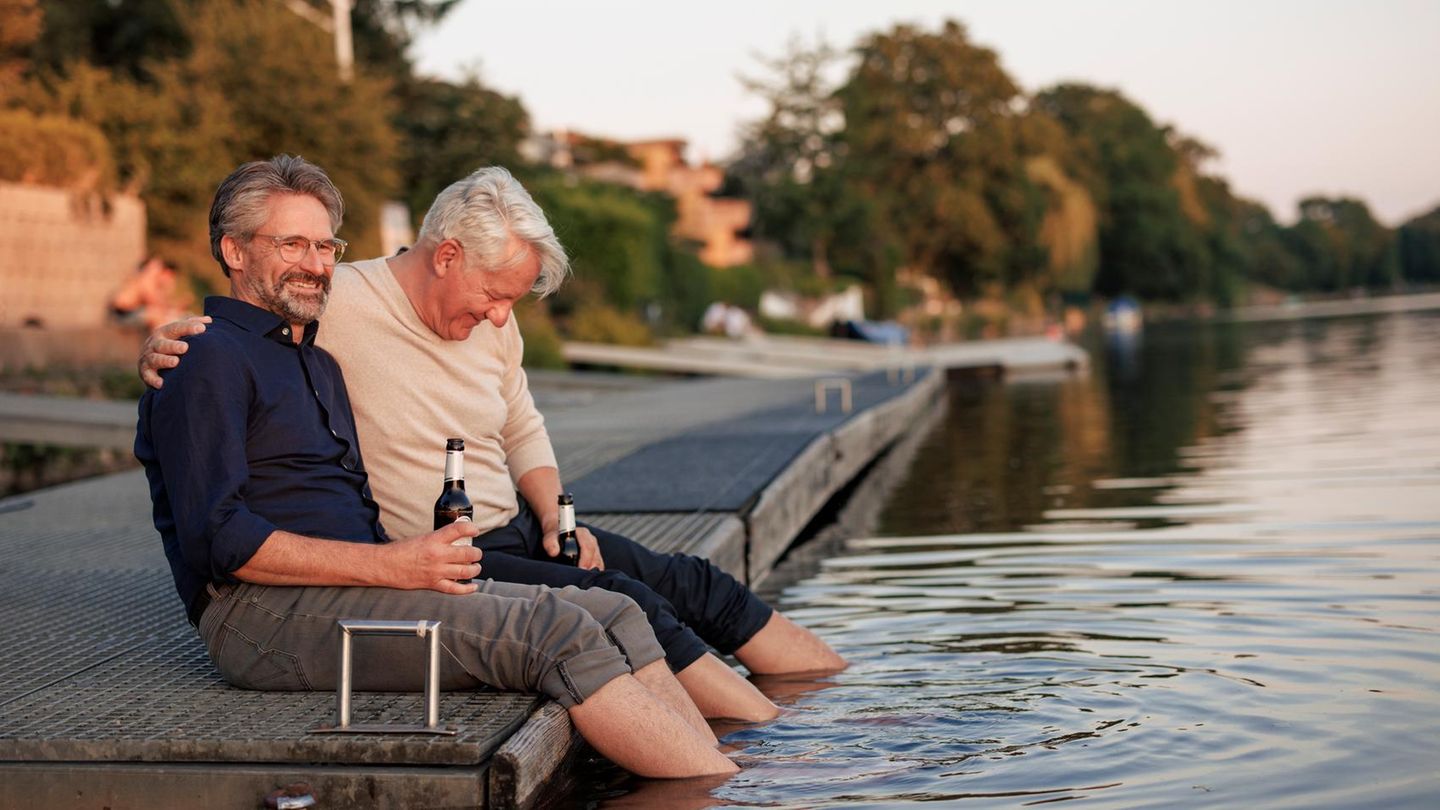He was also general director at Ministry of Foreign Affairs of Spain and is currently ambassador of the European Union in Argentina.
Amador Sánchez Rico European Union interview Sebastián D. Penelli Energy Report
Ambassador Amador Sánchez Rico was interviewed by Energy Report during the lithium seminar in Jujuy.
Journalist: What is the investment weight of the European Union in the region and Argentina today?
Amador Sánchez Rico: The first direct foreign investors from the European Union. The 27 countries of the European Union invest more in Latin America than in China, India, Japan and Russia cumulatively. We are the first partner, the first direct foreign investor in the entire region and in Argentina as well. Almost 50% of the stock of foreign direct investment in Argentina comes from the European Union, and we are in practically all the provinces: in 21 of the 24 there are European companies. We are talking about 800 or 900 European companies generating hundreds of thousands of jobs, direct or indirect.
Journalist: And as for mining?
ASR: There are not so many European companies in the mining sector. Not here, in the world. If you look at the ranking of European companies in mining, you will see that there are not many in the top 30 either. There are a lot of Canadian, Australian, Chinese, American and Swiss companies, a little bit, but there are not so many European ones. What has happened is that we are now not in a perfect storm, but in a conjunction of factors that I would say are very interesting. One is global geopolitics, in which the European Union finds itself at a crossroads. A crossroads, on the one hand we have Russia, on the other hand we have the Chinese workforce, which also keeps us under a lot of pressure and with little competitiveness at the level of the European Union, and a security umbrella from the United States, which perhaps overnight we can no longer count on him. So we have to take the future into our own hands. This global geopolitics is challenging and puts the European Union at a crossroads: it means we have to look for reliable partners. And what doubt is there? That this region, and especially this country, has everything to warm and feed the world. What the world needs, including the European Union, this country has in abundance. These are needs that can be covered in abundance by Argentina.
Journalist: But why now, and not before…
ASR: You’re going to tell me: ‘you have problems in Europe and now you’re looking at this region.’ Well no, because I am saying that there is 900 European companies here and that is not from yesterday. There are some European companies that have been around for more than 100 years. So what does it mean? Yes, we have moved away from this region a little in the last 20 years and we have to reconnect. Global geopolitics, European needs, the abundance of natural resources in this country and some tools that we are putting in place that are very interesting, for example, the issue of RIGI, which we are viewing favorably. The only thing he can do RIGI is to further favor these investments. The agenda Global Gateway of the European Union in responsible investments, is another. They are investments that generate added value, investments that take into account the highest indices or standards of quality, labor conditions and sustainability. That is where we bet, generating added value and jobs here. That is what the European Union offers.
Periodist: In particular, in what type of mineral products?
ASR: With the Lithium Table we have been working. There are beginning to be more European companies in the mining sector in Argentina. Example, that is, Eramet (Eramine South America, from France) opened the direct lithium extraction plant in the Salta town of Güemes. In Jujuy it is Techint (Luxembourg), which already have three projects. It is also Stellantis (Netherlands), which is a large automaker, a conglomerate of automobile companies that is also investing in lithium and copper. And let’s hope they can also benefit from the RIGI and that European development and investment banks, such as the European Investment Bank, can also enter into this type of financial engineering.
(N. del R. Within the framework of its Dare Forward 2030 strategic plan, Stellantis continues to invest in strategic copper and lithium production projects in Argentina. With a new investment of US$120 million, which is added to that already made in February 2023 of US$155 million, Stellantis increased its stake from 14.2% to 19.4% in McEwen Copper. In this way, Stellantis remains the second largest shareholder in the project and ensures part of the sustainable copper supply of the project. the Los Azules mine.)
After that announcement, the EU ambassador Amador Sánchez Ricothe Head of Cooperation of the European Union, Ilse Couge; the advisor of the European Union, Eduardo Barrera; the general director of Stellantis in Argentina, Rodrigo Perez Graziano; the Minister of Mining of San Juan, Juan Pablo Pereaand the Secretary of Environmental Management and Mining Control, Robert Morenovisited the Los Azules project in San Juan.
The visitors were welcomed by Michael Meding general manager of the project, along with part of the Los Azules management team, who presented the development plans and responded to all queries. During the tour, they were shown the mineralization areas and the leach pad, as well as the projected production plan, which estimates a generation of more than 180,000 tons of copper cathodes per year.
Press cloth visit editable.mp4
Journalist: There are some who say that Europe is late to mining in Argentina, do you agree?
ASR: We have been moving away a bit in the last 20 years. But we are very, very, very close on both sides of the Atlantic, although we have been moving away a little for different reasons. I don’t think one is to blame for the other. I think that in Europe we have had many fires or many emergencies around the European Union. We have been expanding towards the east with new countries in the European Union that perhaps the radar or the priority that was given to this region has become a little blurred. We have had many internal challenges since the euro crisis, Brexit, terrorism issues, migration issues, many fires around. It means that perhaps we have been distancing ourselves. Perhaps also focusing or a relationship that is a little distant because we concentrate too much on some issues that divide us instead of those that unite us. For example, maybe Venezuela. And so I think we have to go for a slightly more positive agenda. Last year there was a European Union-CELAC Summit in Brussels. We haven’t organized it for seven years. I think that was already crying out to heaven. Let’s hope there will be one next year. Today we are in the full rapprochement phase. And with Argentina, last year the president of the European Commission came, Ursula von der Leyenwhich has repeated its mandate and we signed a memorandum of understanding on critical minerals, where the lithium. And in terms of energy, where is the LNG, but also the green hydrogen. And we are now in the full implementation phase.
Journalist: The world’s interest in Argentine lithium is seen in the number of projects. Do you think it is advisable to develop local batteries?
ASR: Lithium is here to stay and we are fully committed to continuing to push forward, promoting a competitive green agenda. One thing does not take away from the other. Lithium in itself is generating industrialization. You don’t leave with raw lithium, you are already here generating and industrializing the economy, that is the idea. The ideal would be that in the medium and long term we can see batteries, cells, lithium batteries that are manufactured and produced here in Argentina. But I think that this is already a long-term bet and it is not so easy because batteries also require other products, which perhaps all of them are not so present here. What we want is to bet on investments that generate added value in the country.
image.png

Journalist: How are the negotiations regarding the Mercosur-EU agreement going?
ASR: Let’s hope that the explained elements of global geopolitics help even more to align the stars. Societies on both sides of the Atlantic would live much better with this agreement than without it. We are talking about very complementary markets, a market that would be a total of almost 800 million people. I am optimistic about the geopolitical situation we are going through now and we think that hopefully, or hoping before the end of the year, we can give good news about it.
Journalist: What are the latest obstacles they presented?
ASR: There are four or five discussion blocks. There are technical negotiations on several elements, such as the environment. But I think that we are going to be able to unblock this and be able to move on to the ratification phase, which is another phase.
Journalist: Is there a possibility that Europe will become a buyer of Vaca Muerta LNG in the future?
ASR: It is part of this puzzle, of this puzzle that I mentioned at the beginning. Of course we consume LNG, it is better than coal, than oil, but it is still a transitional energy source. We have goals of becoming the first climate-neutral block in the world in 2050. What does that mean? That we are also going to gradually disengage ourselves from energy or fossil fuels, such as LNG. But we do obviously need LNG. I wish the Vaca Muerta LNG was now arriving in Europe. It is not the case. Let’s say that better late than never, but it is also true that we have an ambitious agenda ahead of us in terms of energy transition. We are watching it with great interest.
Journalist: What does it depend on?
ASE: What Europe has had to do in the face of this invasion of Ukraine has been, first, diversify its partners. And I wish that in this case Argentina had been there to make up for the cut (of gas supply) that we have made from Russia. This is not the case, because the infrastructure has not been built yet, nor is the liquefaction plant in Bahía Blanca or Río Negro yet built. But I wish it had been. For this reason, we have had to diversify, bet on renewables. Today in Europe 50% of the energy we consume comes from renewables. And what we have also had is to bet in a much more ambitious way on energy efficiency.
Journalist: That’s why a memorandum was signed…
ASR: We have signed a Memorandum of Understanding with Argentina last year on energy, apart from the issue of critical materials or mining, and there is LNG and green hydrogen, we want to work with that, but with our calendar and our priorities.
Journalist: Is there an interest in having more European presence in the region to stop China’s advance?
ASR: We already have enough work here, at the Embassy and with the countries of the European Union, without having to deal with investments from China. I insist, we have practically 50% foreign direct investment here from the European Union. But let’s not rest on our laurels. Let us not think that this gives us any kind of guarantee. We are now talking about critical, strategic materials, where the European Union has to be present. Because if we are not, others are going to occupy that space.
Source: Ambito
I am an author and journalist who has worked in the entertainment industry for over a decade. I currently work as a news editor at a major news website, and my focus is on covering the latest trends in entertainment. I also write occasional pieces for other outlets, and have authored two books about the entertainment industry.




